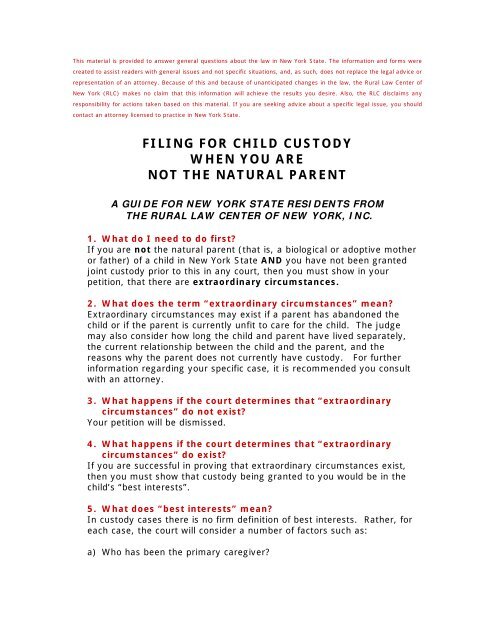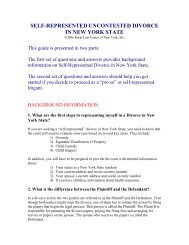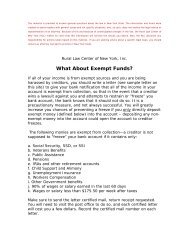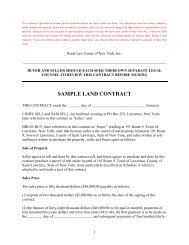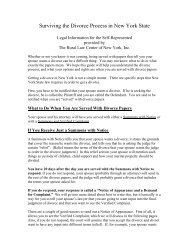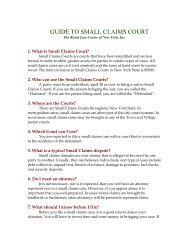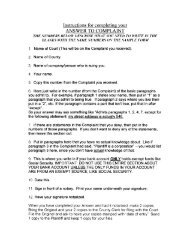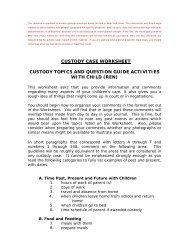Non-Parent Filing for Child Custody - Rural Law Center of New York
Non-Parent Filing for Child Custody - Rural Law Center of New York
Non-Parent Filing for Child Custody - Rural Law Center of New York
You also want an ePaper? Increase the reach of your titles
YUMPU automatically turns print PDFs into web optimized ePapers that Google loves.
This material is provided to answer general questions about the law in <strong>New</strong> <strong>York</strong> State. The in<strong>for</strong>mation and <strong>for</strong>ms werecreated to assist readers with general issues and not specific situations, and, as such, does not replace the legal advice orrepresentation <strong>of</strong> an attorney. Because <strong>of</strong> this and because <strong>of</strong> unanticipated changes in the law, the <strong>Rural</strong> <strong>Law</strong> <strong>Center</strong> <strong>of</strong><strong>New</strong> <strong>York</strong> (RLC) makes no claim that this in<strong>for</strong>mation will achieve the results you desire. Also, the RLC disclaims anyresponsibility <strong>for</strong> actions taken based on this material. If you are seeking advice about a specific legal issue, you shouldcontact an attorney licensed to practice in <strong>New</strong> <strong>York</strong> State.FILING FOR CHILD CUSTODYWHEN YOU ARENOT THE NATURAL PARENTA GUIDE FOR NEW YORK STATE RESIDENTS FROMTHE RURAL LAW CENTER OF NEW YORK, INC.1. What do I need to do first?If you are not the natural parent (that is, a biological or adoptive motheror father) <strong>of</strong> a child in <strong>New</strong> <strong>York</strong> State AND you have not been grantedjoint custody prior to this in any court, then you must show in yourpetition, that there are extraordinary circumstances.2. What does the term “extraordinary circumstances” mean?Extraordinary circumstances may exist if a parent has abandoned thechild or if the parent is currently unfit to care <strong>for</strong> the child. The judgemay also consider how long the child and parent have lived separately,the current relationship between the child and the parent, and thereasons why the parent does not currently have custody. For furtherin<strong>for</strong>mation regarding your specific case, it is recommended you consultwith an attorney.3. What happens if the court determines that “extraordinarycircumstances” do not exist?Your petition will be dismissed.4. What happens if the court determines that “extraordinarycircumstances” do exist?If you are successful in proving that extraordinary circumstances exist,then you must show that custody being granted to you would be in thechild’s “best interests”.5. What does “best interests” mean?In custody cases there is no firm definition <strong>of</strong> best interests. Rather, <strong>for</strong>each case, the court will consider a number <strong>of</strong> factors such as:a) Who has been the primary caregiver?
) Need <strong>for</strong> stability and continuity in the child’s life.c) Relative financial ability <strong>of</strong> the caregiversd) Quality <strong>of</strong> the home environment and the parental guidance eachcaregiver provides.e) Ability to provide <strong>for</strong> the child’s emotional and intellectualdevelopment.f) Relative fitness <strong>of</strong> each prospective caregiver.g) Length <strong>of</strong> time the present custodial arrangement has been in effect.h) Desires <strong>of</strong> the child.6. What in<strong>for</strong>mation do I need to have be<strong>for</strong>e I fill out thepetition?You need to gather these facts BEFORE you complete the custodypetition because this in<strong>for</strong>mation will guide you to the correct <strong>for</strong>m to use.You need to know:a) Name, address, phone number and social security number <strong>of</strong> eachparent.b) Name, date <strong>of</strong> birth, and social security number <strong>of</strong> the child.c) Name <strong>of</strong> person who has physical custody <strong>of</strong> the child.d) If there are any other petitions <strong>for</strong> custody or visitation <strong>of</strong> the child,and if so, the date, the court, and the results <strong>of</strong> the case. If there arecustody orders that have been issued by the courts regarding thechild, then you must use the <strong>for</strong>m entitled “PETITION FORMODIFICATION OF CUSTODY”. If there are not any prior custodyorders, then you should use the <strong>for</strong>m entitled “PETITION GFORCUSTODY”.e) Are the natural parents married, divorced, or legally separated? If so,then include the date <strong>of</strong> each event that applies to each naturalparent.f) Do you have any knowledge <strong>of</strong> any Temporary or Permanent Orders <strong>of</strong>Protection issued against either natural parent? Are there anyTemporary or Permanent Orders <strong>of</strong> Protection issued against you? Ifavailable, please specify the court, the index number, the date <strong>of</strong> theorder, status <strong>of</strong> the case, and whether there are any upcoming courtdates.
g) Do you have any knowledge <strong>of</strong> any pending criminal domestic violencecases against either natural parent? If so, there is a possibility thatthe child custody case could be transferred by the courts to theintegrated domestic violence court in your county. As <strong>of</strong> October2006, there are integrated domestic violence courts in Clinton, Essex,and Franklin counties.7. Do I need to have the petition notarized?Yes. You must sign your petition in the presence <strong>of</strong> a notary.8. Is there a fee <strong>for</strong> filing my petition?No, there is no cost to file the file with the Family Court.9. What happens after I file my petition?You and all the other parties to the case will be notified by the court <strong>of</strong>the first court appearance date. Since you filed the petition, you are the“Petitioner”. The parties you filed against are the “Respondents”.From the date the respondents receive the petition, they will have 20days to file their response to your petition with the court.10.What does “serving the petition” mean?It means that a copy <strong>of</strong> your petition must be delivered to therespondents. If the Department <strong>of</strong> Social Services is involved, they mustalso be served with a copy <strong>of</strong> the petition.11. What do I need to know about going to court?Always be on time. Appearance matters, so wear your most pr<strong>of</strong>essionaloutfit. Be polite to all involved, that is, the court personnel, the attorneys,and caseworkers.Remember to speak clearly and loudly enough <strong>for</strong> all to hear you. ALWAYSfollowthe judge’s orders.12. How can I prepare <strong>for</strong> my case?1) KEEP A JOURNAL.
Your custody journal is a daily record <strong>of</strong> events which impact the children’s’lives, andreflect upon your abilities as a caregiver. This journal should be kept on adaily basis, both so that you do not <strong>for</strong>get important events and so that youare not later accused <strong>of</strong>“erasing events” which may or may not have occurred.List both routine and special events which take place on any givenday.While routine items such as preparation <strong>of</strong> a meal may not seem importantat first, when viewed as part <strong>of</strong> a long-term pattern <strong>of</strong> care, they take ongreat significance. Be as detailed as you like. For example, your description<strong>of</strong> a meal’s preparation might include a “menu” to show that the childreceives nutritional meals as well as a description <strong>of</strong> the child’s role atmealtime when they help set or clear the table, or fix the salad or dessert.In this way, you are showing that they are also taught a sense <strong>of</strong>responsibility and teamwork.Your journal should also include statements that the child makes, ora description <strong>of</strong> matters which you and the child discuss. These donot need to be matters directly relating to custody – in most cases itis not helpful <strong>for</strong> you to “provoke” discussion about custody, but you mayinclude the child’s feelings about you or the parents, as well as the child’sstatements about day-to-day occurrences.2) PHOTOGRAPHS/VIDEOThe old adage, “a picture is worth a thousand words” <strong>of</strong>ten holdstrue in custody cases. Photographs can be used to illustrate some aspect<strong>of</strong> your ability as a parent, whether it is to show the court the physicalsetting <strong>of</strong> your home, living or sleeping areas, or to show various events andactivities you enjoy with the child.Photograph routine events in the child’s life such as getting <strong>of</strong>f the schoolbus or saying bedtime prayers. These will illustrate your daily involvementwith the child.Photograph special events such as holidays, vacations, and trips. Be sureto include the child’s friends, aunts, uncles, and extended family. Do not<strong>for</strong>get to include yourself in these pictures.
If any bad things happen, such as a bruise on the child, you should take apicture. Also, preserve any photographs or family albums that you alreadyhave so there is a record <strong>of</strong> your past involvement in the life <strong>of</strong> the child3) RECORDS AND DOCUMENTSYou should begin to gather those documents and comments whichwill demonstrate your strengths in caring <strong>for</strong> the child.Collecting pediatrician bills will show your attention to the child’s healthmatters. Report cards and school correspondence can illustrate yourinvolvement in the child’s education. A birdhouse or artwork made by thechild can be helpful in giving insight into the child’s feelings.It is very likely that the contents <strong>of</strong> your journal will be used in court shouldyour case go to trial. It may be used to show contemporaneous recordings<strong>of</strong> events or to refresh your recollection on the witness stand. So, be carefulwhat you write. The journal is not a place to chronicle your love life or toapologize <strong>for</strong> any shortcomings you may feel you have in your parenting role.While it is proper to write about the other parties in a bad light, be carefulnot to overdo it. The tone <strong>of</strong> your journal should be generally positive.Remember, your journal is one <strong>of</strong> the most important devices available toassist you in your case.CUSTODY WORKSHEETIn short paragraphs that correspond with letters A through T andnumbers 1 through 148, COMMENT ON THE FOLLOWING AREAS.These guidelines are roughly equivalent to the areas that will becovered by you at trial. It can not be emphasized strongly enough t<strong>of</strong>ully list examples <strong>of</strong> past and present, with dates.A. Time - Past, Present, and Future Time with the <strong>Child</strong>1. your hours <strong>of</strong> work 2. days <strong>of</strong> work 3. your travel and absence from thehome.4. child’s departure and return from school 5. bedtime 6. time schedule ifyou are awarded custody.B. Food and Feeding7. meals with the child, 8. food preparation, 9. shopping 10. ensuring abalanced diet 11. eating sufficiently, not too much or too little 12. tablemanners 13. meals outside the home.
C. Cleanliness and Attention to Body14. wash hands, face, ears 15. bathing/showering 16. toilet training 17.clean nails18. brushed and combed hair 19. acne 20. use <strong>of</strong> cosmetics 21. keep childneat22. see that house and child’s room is clean 23. beds made 24. put child tosleep25. stayed with them 26. when child would wake up 27. play on beach 28.swimming29. out <strong>of</strong> doors 30. playground 31. walk with them 32. athletic gamesincluding games participated in by you and the childD. Medical33. visits to pediatrician 34. doctor 35. check-ups 36. special attention 37.follow prescriptions 38. give medicines 39. during illness 40. stayed withchild 41. attended to them 42. advised parent/sE. Dental43. visits to dentist 44. teeth brushing 45. water pick 46. boughttoothpaste 47. braces 48. orthodontiaF. Clothing49. purchase and attention to appearance, sizes, quality, utility, warmth,cost 50. dress them or help them to dress 51. undress them or help themundress 52. laundry 53. mending 54. sewingG. Attention to Mind55. read to them 56. television (choices and limitations) 57. movies 58.crossword puzzles, monopoly, and other games 59. theatre 60. plays <strong>for</strong>children 61. magic showsH. Education62. what schools 63. how child goes or will go to school 64. visits to school65. conference with teachers 66. see they do homework 67. help withhomework – not too much - not too littleI. Music68. sing with them 69. musical instruments 70. listening to CD’s 71. choice<strong>of</strong> CD’sJ. Psychological and Emotional72. your relations with mother/father 73. child’s relations with mother/father74. encourage relations and activities with mother/father 75. relations withgrandparents76. relations between siblings; encourage no favoritism, take children outtogether and individually 77. birthday <strong>of</strong> child 78. birthday <strong>of</strong> child’s siblings79. parties
80. association with other children 81. Christmas 82. Hanukkah 83. Easter84. child – happy with mother/father 85. cooperation with therapist,counselor, school or other psychologist 86. follow advice <strong>of</strong> thesepr<strong>of</strong>essionalsK. Sex87. education 88. special problems and guidance 89. menstruation –assistance <strong>of</strong> aunts or paternal/maternal grandmothers 90. guidanceL. Play with <strong>Child</strong>ren91. playground – swings, see-saws 92. games 93. home 94. outside – playwith children and/or transportation to or attendance at sporting events childparticipates inM. Discipline <strong>of</strong> <strong>Child</strong>95. manners 96. speech 97. politeness 98. how administeredN. Religion <strong>of</strong> <strong>Child</strong>99. Sunday school 100. religious school 101. holy days 102. prayers 103.symbolism in home 104. attendance at services 105. respect <strong>for</strong> otherfaiths 106. religious books107. confirmation – first communion 108. bar mitzvah 109. bat mitzvahO. Chronological Description <strong>of</strong> Activities with <strong>Child</strong>110. typical day – morning, afternoon, night 111. be<strong>for</strong>e child attendedschool 112. school days 113. typical weekend – Saturday, Sunday 114.VacationP. Your Health and Health <strong>of</strong> Mother/Father115. physical 116. psychological 117. drugs 118. alcoholQ. Evaluation <strong>of</strong> You and Mother/Father119.gentle 120. kind 121. sweet 122. patient 123. attentive 124. caring125. considerate 126. intelligent 127. careful 128. reliableR. Affection – Demonstration129. love 130. words <strong>of</strong> love by you, and mother/father 131. child – words<strong>of</strong> love 132. laugh together 133. cuddling 134. kissing 135. hugging 136.smoochingS. Negative Actions137. mistreat 139. beat 140. abuse 141. yell and scream 142. inattentive143. rude144. improperT. Last Questions145. Can you be the most effective caregiver?146. If custody is granted to you, will you endeavor to respect andstrengthen the relationship between the child and mother/father?147. Do you deeply realize that the child needs the love and attention <strong>of</strong> youand their mother and father?148. Do you ask this court to award custody <strong>of</strong> the child to you?


